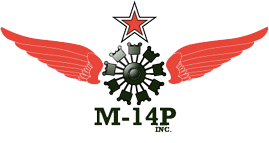TECHNICAL GUIDES
TECHNICAL INFORMATION
Sudden Stoppage
Hydraulic Lock Article
V-530 Prop Blade Install & Settings
Centrifugal Advanced Magneto
Introduction to the M-14P
To add our experience on the “sudden stoppage” question, I offer the following with respect to M-14P engines and V-530 props:
While we have not sold hundreds of aircraft, since 1993 we have repaired more engines than anyone in the West, including complete teardowns. We are also certified by OKBM for repair and overhaul of the M-14P.
Let’s start by defining terms. A “prop strike” alone says nothing about forces experienced by the engine. A “sudden stoppage” defines a reduction in engine RPM from some external or internal cause. The rate of deceleration is the key to how much damage may have occurred. We have seen only four sources of stoppage:
- The engine had oil in a cylinder that did not compress with the air start turning the engine. This will usually result in a bent link rod. A teardown of the power section is necessary to check crank runout (necessary) and is perhaps the easiest way to change the link rod as any other way.To add our experience on the “sudden stoppage” question, I offer the following with respect to M-14P engines and V-530 props:
- The engine had oil in a cylinder or sucked it in from the intake tube and did not compress after the engine fired. The first thing to check, if the engine will turn, is the magneto timing. This tells if the accessory shaft is twisted. Next, a teardown of the power section. We usually find the crank rear counterweight has rotated on the bearing shaft. This is a quick, cheap fix. Continued rotation, however, results in broken teeth on the cam drive gear and cam idler gear. Broken teeth on the generator drive gear and damaged accessory shaft are very possible. A new link rod and probably a new cylinder will also be needed.
- A previously bent link rod fails in flight. The prop shaft will shear. In the worst case we have seen, there were two pistons in one cylinder. The entire engine will be trash.To add our experience on the “sudden stoppage” question, I offer the following with respect to M-14P engines and V-530 props:
- The rotating prop hits something. If you taxi into something solid like a fire hydrant, the resultant damage will be the same as in #2 above, except for no damage to a link rod or cylinder. If you experience a gear up landing you have to make a decision. At landing speed, the aircraft travels 3.5 feet for each blade in contact with the ground at initial point of contact. As the engine slows, this increases. Consequently, the rearward deflection of a very thin blade exceeds the rotational shearing. Additionally, the reduction of blade length per rotation with a normal flare landing is less than a tenth of an inch. In other words, the wood fails well before any engine parts are stressed to the +400 foot/lbs of torque design load.
To add our experience on the “sudden stoppage” question, I offer the following with respect to M-14P engines and V-530 props:
We had many conversations with the Russian overhaul factory during the 90’s and with OKBM in 2001. They require a teardown under their system (labor is cheap) but no one could recall damage from a gear up landing. We have sold 20 – 30 sets of blades for replacements on gear up landings with no known subsequent problems with the engines. Having overhauled many V530 prop hubs, there is no doubt that it will fail last.
If you land gear up, you must weigh the costs, down time, damage probabilities and future consequences.
~Carl W. Hays
